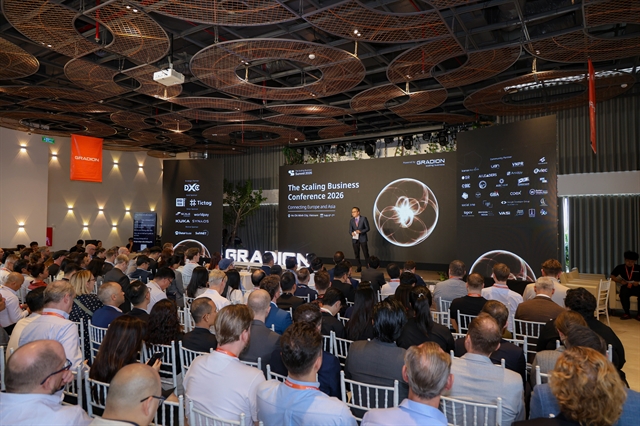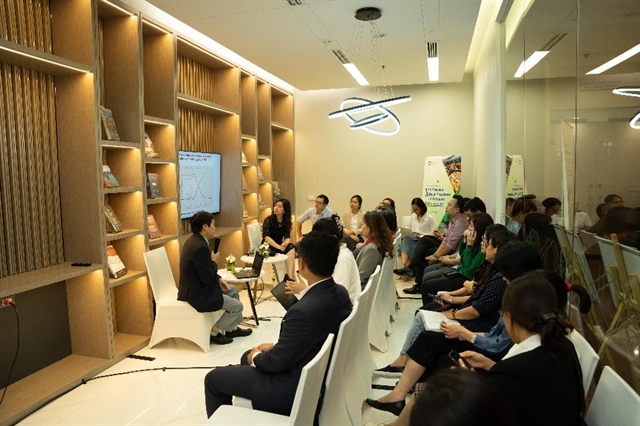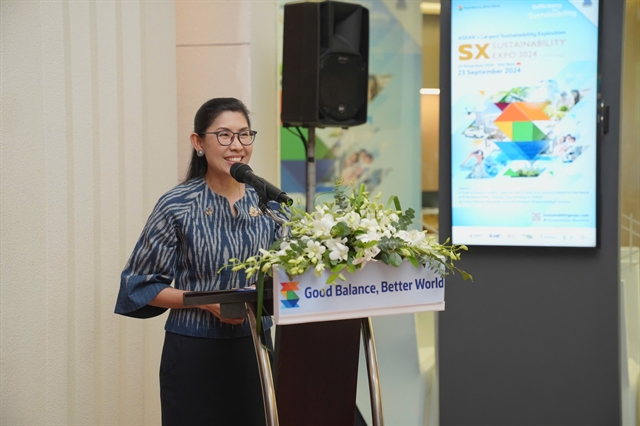 Economy
Economy


|
| Speakers, Nguyen Trung Thang and Truong Hanh Linh, at the workshop on EPR, part of SX Roadshow 2024 – Vietnam. — Photo courtesy of C asean Vietnam |
HÀ NỘI — The strategic waste management tool, Extended Producer Responsibility (EPR), in Việt Nam was the main topic of discussion at a workshop on September 23 in Hà Nội.
The event was organised by C asean Vietnam, attracting the participation of experts and representatives from various sectors of manufacturing, packaging, agri-food, F&B, real estate and finance.
As Việt Nam continues to pursue its sustainable development goals, the workshop provided a forum for experts, consultants and corporate representatives, to discuss the application of EPR - an important tool in managing and promoting sustainable development in Việt Nam.
Deputy Director of the Institute of Strategy and Policy on Natural Resources and Environment under the Ministry of Natural Resources and Environment (MONRE), Nguyễn Trung Thắng, opened the workshop with updates on EPR policy and its implementation roadmap in Việt Nam.
Thắng emphasised that EPR is not only a tool for waste management but also plays a crucial role in advancing the circular economy and supporting Việt Nam’s net zero goals. He highlighted the current challenges, including improving recycling and waste treatment infrastructure, developing the recycling industry, approving standards, completing green finance management mechanisms and factors that will drive effective EPR implementation.
Head of Risk Consulting, ESG Consulting, KPMG Vietnam, Trương Hạnh Linh, talked about best practices from international experience and discussed the importance of EPR for Vietnamese businesses.
According to Linh, Vietnamese companies are becoming increasingly aware of the importance of EPR, however, they still face numerous challenges during implementation, particularly concerning governance, cost and technology.
Linh also stressed the need for collaboration among the government, businesses and consumers to achieve sustainability goals. She introduced the CTI (Circular Transition Indicator) model, designed to measure the effectiveness of EPR efforts within businesses.
During the event, business representatives shared their experiences and challenges in applying EPR and discussed ideas to further improve the recycling process and contribute to sustainable development in Việt Nam.
The business representatives emphasised the importance of cooperation between enterprises and the government, such as policies supporting green finance, the development of standards and certifications for businesses successfully implementing EPR, capacity-building programmes and resource mobilisation to ensure a smooth EPR transition.
Representatives from the Ministry of Natural Resources and Environment also added that the government is working to formalise and support the recycling industry by attracting investment to assist businesses.

|
| Thai Ambassador Urawadee Sriphiromya, delivered the opening remarks at the SX Roadshow 2024 in Việt Nam. — Photo courtesy of C asean Vietnam |
On the same day, C asean Vietnam also organised the SX Roadshow 2024 – Vietnam, an event under the framework of the Sustainability Expo 2024 (SX2024), ASEAN’s largest sustainability exhibition, which will take place from September 27 to October 6 at the Queen Sirikit National Convention Center in Bangkok, Thailand.
Chief Representative of C asean Vietnam, Nguyễn Hải Sơn shared that the series of events serves as a testament to C asean Việt Nam’s commitment to promoting sustainable development and environmental responsibility in Việt Nam while enhancing connections between stakeholders across the ASEAN region.
C asean Vietnam is the Vietnam branch of C asean, an organisation dedicated to creating a platform to connect ASEAN communities, focused on three key pillars: business and sustainability, leadership and talent development and arts and culture, under the auspices of Thai Beverage Plc. (ThaiBev). — VNS




